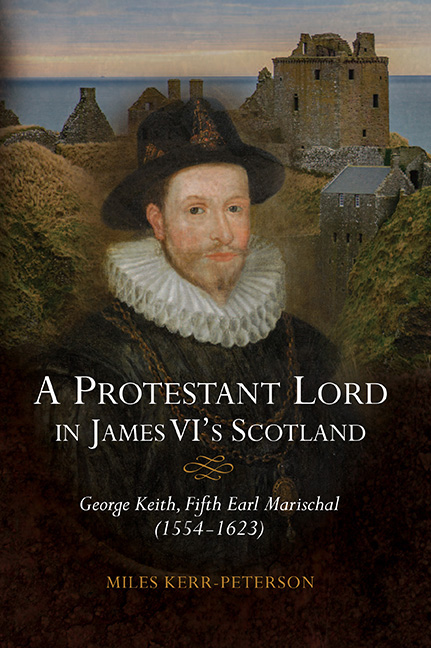Book contents
- Frontmatter
- Contents
- List of Illustrations
- Acknowledgements
- Conventions
- Abbreviations
- Map
- Introduction
- 1 Inheritance and Education, 1513–1582
- 2 Three Feuds and Jacobean Politics, 1582–1595
- 3 Service to the State, 1595–1623
- 4 Defending the Borders of the Earldom, 1595–1623
- 5 Family Strategies and Crises, 1595–1623
- 6 Lordship and the Reformed Kirk, 1560–1623
- 7 Economic Activities, 1581–1623
- 8 Marischal College, 1593–1623
- Conclusion
- Appendices: Genealogies
- Bibliography
- Index
- St Andrew Studies in Scottish History
5 - Family Strategies and Crises, 1595–1623
Published online by Cambridge University Press: 13 April 2019
- Frontmatter
- Contents
- List of Illustrations
- Acknowledgements
- Conventions
- Abbreviations
- Map
- Introduction
- 1 Inheritance and Education, 1513–1582
- 2 Three Feuds and Jacobean Politics, 1582–1595
- 3 Service to the State, 1595–1623
- 4 Defending the Borders of the Earldom, 1595–1623
- 5 Family Strategies and Crises, 1595–1623
- 6 Lordship and the Reformed Kirk, 1560–1623
- 7 Economic Activities, 1581–1623
- 8 Marischal College, 1593–1623
- Conclusion
- Appendices: Genealogies
- Bibliography
- Index
- St Andrew Studies in Scottish History
Summary
Aside from lands, legal status, jurisdiction and influence, the earldom headed by the Earl Marischal, of course, was also made up of people. Unfortunately, they are perhaps the hardest part of the earldom to delineate. While the lands held by the Earl Marischal were often described in great detail in charters, no similar sort of documentation survive to say who was part of this, or what their roles were. As such, this chapter will attempt to make some comment on the earldom's allies and the wider Keith kindred. Given the dearth of material, it will then move on to firmer historical ground, to see what the earl's close family can tell us about his strategies of lordship, succession and family alliances, and what these examples can shed light on. As will be seen, and has already been seen at points in chapter two, the close family relationships at the top of the earldom could often resemble something of a soap opera, containing a fair dose of intrigue, adultery and quarrels, which, at times, could be more bitter than anything seen in the previous chapters with the earl's disputes with his fellow noblemen.
The Keiths
We have little firm knowledge of Marischal's network of allies and dependents. Although we have many mentions of Marischal being allied to other noblemen, these tend to all be in relation to specific events. So, as we saw in the previous chapter, he might be allied to the earl of Erroll in mutual protection against the earl of Huntly in 1589, but also in an army opposing Erroll in the same year, during the Brig o’ Dee rebellion. In chapter two we saw Marischal temporarily cease his feud with Huntly when Chancellor Maitland became his more pressing opponent, and Huntly even mediated between Marischal and Erroll during their later feud. Noble relationships were fluid and circumstantial.
We can get a faint sense of some of the lairdly families with close associations with the Keiths. The Arbuthnotts, for example, regularly intermarried with the earl's close family. Yet we have no formal evidence to describe the nature of their relationship. This is perhaps not surprising. Again, relationships between houses were likely to be informal for most of the time, only needing more detailed arrangements, through bonds of protection or bonds of manrent, during political crises.
- Type
- Chapter
- Information
- A Protestant Lord in James VI's ScotlandGeorge Keith, Fifth Earl Marischal (1554–1623), pp. 103 - 116Publisher: Boydell & BrewerPrint publication year: 2019



